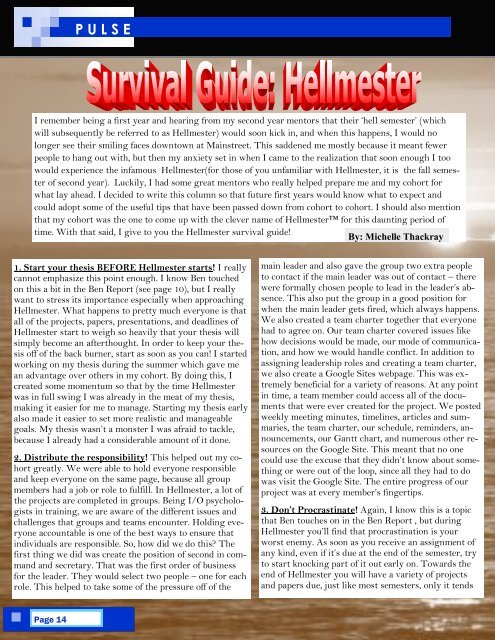Keeping everyone on the same beat.
Keeping everyone on the same beat.
Keeping everyone on the same beat.
You also want an ePaper? Increase the reach of your titles
YUMPU automatically turns print PDFs into web optimized ePapers that Google loves.
I remember being a first year and hearing from my sec<strong>on</strong>d year mentors that <strong>the</strong>ir ‘hell semester’ (which<br />
will subsequently be referred to as Hellmester) would so<strong>on</strong> kick in, and when this happens, I would no<br />
l<strong>on</strong>ger see <strong>the</strong>ir smiling faces downtown at Mainstreet. This saddened me mostly because it meant fewer<br />
people to hang out with, but <strong>the</strong>n my anxiety set in when I came to <strong>the</strong> realizati<strong>on</strong> that so<strong>on</strong> enough I too<br />
would experience <strong>the</strong> infamous Hellmester(for those of you unfamiliar with Hellmester, it is <strong>the</strong> fall semester<br />
of sec<strong>on</strong>d year). Luckily, I had some great mentors who really helped prepare me and my cohort for<br />
what lay ahead. I decided to write this column so that future first years would know what to expect and<br />
could adopt some of <strong>the</strong> useful tips that have been passed down from cohort to cohort. I should also menti<strong>on</strong><br />
that my cohort was <strong>the</strong> <strong>on</strong>e to come up with <strong>the</strong> clever name of Hellmester for this daunting period of<br />
time. With that said, I give to you <strong>the</strong> Hellmester survival guide!<br />
By: Michelle Thackray<br />
Page 14<br />
P U L S E<br />
1. Start your <strong>the</strong>sis BEFORE Hellmester starts! I really<br />
cannot emphasize this point enough. I know Ben touched<br />
<strong>on</strong> this a bit in <strong>the</strong> Ben Report (see page 10), but I really<br />
want to stress its importance especially when approaching<br />
Hellmester. What happens to pretty much <str<strong>on</strong>g>every<strong>on</strong>e</str<strong>on</strong>g> is that<br />
all of <strong>the</strong> projects, papers, presentati<strong>on</strong>s, and deadlines of<br />
Hellmester start to weigh so heavily that your <strong>the</strong>sis will<br />
simply become an afterthought. In order to keep your <strong>the</strong>sis<br />
off of <strong>the</strong> back burner, start as so<strong>on</strong> as you can! I started<br />
working <strong>on</strong> my <strong>the</strong>sis during <strong>the</strong> summer which gave me<br />
an advantage over o<strong>the</strong>rs in my cohort. By doing this, I<br />
created some momentum so that by <strong>the</strong> time Hellmester<br />
was in full swing I was already in <strong>the</strong> meat of my <strong>the</strong>sis,<br />
making it easier for me to manage. Starting my <strong>the</strong>sis early<br />
also made it easier to set more realistic and manageable<br />
goals. My <strong>the</strong>sis wasn’t a m<strong>on</strong>ster I was afraid to tackle,<br />
because I already had a c<strong>on</strong>siderable amount of it d<strong>on</strong>e.<br />
2. Distribute <strong>the</strong> resp<strong>on</strong>sibility! This helped out my cohort<br />
greatly. We were able to hold <str<strong>on</strong>g>every<strong>on</strong>e</str<strong>on</strong>g> resp<strong>on</strong>sible<br />
and keep <str<strong>on</strong>g>every<strong>on</strong>e</str<strong>on</strong>g> <strong>on</strong> <strong>the</strong> <strong>same</strong> page, because all group<br />
members had a job or role to fulfill. In Hellmester, a lot of<br />
<strong>the</strong> projects are completed in groups. Being I/O psychologists<br />
in training, we are aware of <strong>the</strong> different issues and<br />
challenges that groups and teams encounter. Holding <str<strong>on</strong>g>every<strong>on</strong>e</str<strong>on</strong>g><br />
accountable is <strong>on</strong>e of <strong>the</strong> best ways to ensure that<br />
individuals are resp<strong>on</strong>sible. So, how did we do this? The<br />
first thing we did was create <strong>the</strong> positi<strong>on</strong> of sec<strong>on</strong>d in command<br />
and secretary. That was <strong>the</strong> first order of business<br />
for <strong>the</strong> leader. They would select two people – <strong>on</strong>e for each<br />
role. This helped to take some of <strong>the</strong> pressure off of <strong>the</strong><br />
main leader and also gave <strong>the</strong> group two extra people<br />
to c<strong>on</strong>tact if <strong>the</strong> main leader was out of c<strong>on</strong>tact – <strong>the</strong>re<br />
were formally chosen people to lead in <strong>the</strong> leader’s absence.<br />
This also put <strong>the</strong> group in a good positi<strong>on</strong> for<br />
when <strong>the</strong> main leader gets fired, which always happens.<br />
We also created a team charter toge<strong>the</strong>r that <str<strong>on</strong>g>every<strong>on</strong>e</str<strong>on</strong>g><br />
had to agree <strong>on</strong>. Our team charter covered issues like<br />
how decisi<strong>on</strong>s would be made, our mode of communicati<strong>on</strong>,<br />
and how we would handle c<strong>on</strong>flict. In additi<strong>on</strong> to<br />
assigning leadership roles and creating a team charter,<br />
we also create a Google Sites webpage. This was extremely<br />
beneficial for a variety of reas<strong>on</strong>s. At any point<br />
in time, a team member could access all of <strong>the</strong> documents<br />
that were ever created for <strong>the</strong> project. We posted<br />
weekly meeting minutes, timelines, articles and summaries,<br />
<strong>the</strong> team charter, our schedule, reminders, announcements,<br />
our Gantt chart, and numerous o<strong>the</strong>r resources<br />
<strong>on</strong> <strong>the</strong> Google Site. This meant that no <strong>on</strong>e<br />
could use <strong>the</strong> excuse that <strong>the</strong>y didn’t know about something<br />
or were out of <strong>the</strong> loop, since all <strong>the</strong>y had to do<br />
was visit <strong>the</strong> Google Site. The entire progress of our<br />
project was at every member’s fingertips.<br />
3. D<strong>on</strong>’t Procrastinate! Again, I know this is a topic<br />
that Ben touches <strong>on</strong> in <strong>the</strong> Ben Report , but during<br />
Hellmester you’ll find that procrastinati<strong>on</strong> is your<br />
worst enemy. As so<strong>on</strong> as you receive an assignment of<br />
any kind, even if it’s due at <strong>the</strong> end of <strong>the</strong> semester, try<br />
to start knocking part of it out early <strong>on</strong>. Towards <strong>the</strong><br />
end of Hellmester you will have a variety of projects<br />
and papers due, just like most semesters, <strong>on</strong>ly it tends












